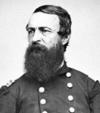- Porter, David Dixon
-
died Feb. 13, 1891, Washington, D.C.U.S. naval officer.He served under his father, David Porter, in the West Indies and in the Mexican navy before joining the U.S. Navy in 1829. Promoted to commander in the American Civil War, he served under his foster brother, David Farragut, to help win the Battle of New Orleans. In 1863 he succeeded in running his fleet past the Confederate fort at Vicksburg to meet Ulysses S. Grant's troops and complete the effort to open the Mississippi River to Union forces. After the war he served as superintendent of the U.S. Naval Academy (1865–69) and was promoted to admiral (1870).
 David Dixon Porter, photograph; in the Mathew Brady collectionBy courtesy of the Library of Congress, Washington, D.C.
David Dixon Porter, photograph; in the Mathew Brady collectionBy courtesy of the Library of Congress, Washington, D.C.* * *
▪ United States naval officerborn June 8, 1813, Chester, Pa., U.S.died Feb. 13, 1891, Washington, D.C.U.S. naval officer who held important Union commands in the American Civil War (1861–65).The son of Commodore David Porter, David Dixon Porter served in the Mexican War (1846–48). Promoted to commander early in the American Civil War, he participated in Union expeditions against New Orleans, La., and Vicksburg, Miss. (April to June 1862), under his foster brother, Commander David Farragut.In the spring of 1863 Porter succeeded in running his fleet past the Confederate fortress at Vicksburg, halfway between Memphis, Tenn., and New Orleans on the Mississippi River. He next overcame the Confederate forts at Grand Gulf, Miss., south of Vicksburg, enabling a rendezvous of his fleet there with the troops of the invading Union army under General Ulysses S. Grant at Bruinsburg, Miss. Grant's troops then took Vicksburg, and the joint army-navy effort effectively cut the Confederacy in two. Porter received the thanks of Congress for “opening the Mississippi” and was promoted to rear admiral. He next cooperated in the Red River Campaign (March to May 1864), in which his gunboats, held above Alexandria, La., by shallow water and rapids, narrowly escaped isolation. In October he assumed command of the North Atlantic blockading squadron and was eventually responsible for the fall of Fort Fisher, N.C. (January 1865).From 1865 to 1869 Porter was superintendent of the U.S. Naval Academy at Annapolis, Md. He was promoted to admiral in 1870. He wrote several naval books and two novels.* * *
Universalium. 2010.
